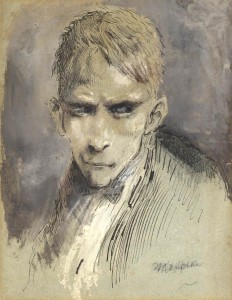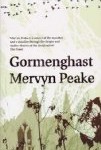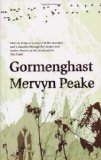Gormenghast
Thirty-Eight – Fitfty-Eight (p565 – p659)
.
.
.This week’s Gormenghast discussion is written by Falaise from 2606 Books and Counting. He is a blogger who, given the average life expectancy of a British man, realised that he will probably only manage to read 2606 books in the rest of his life. He is prioritising the important ones by working his way through 1001 Books: You Must Read Before You Die.
Jackie has very kindly allowed me to barge into her blog to share some thoughts on this third week of the Gormenghast segment of the Gormenghast Read-along. It’s a good week to have this opportunity as it’s been spectacularly eventful in the book, with Steerpike taking centre stage once again.
 I’ve always pictured him as being pale, sinuous, almost serpentine in appearance but, over the past couple of weeks, another image has been elbowing its way into my mind. You see, I am starting to have these flashes of seeing Steerpike as a villain from the days of silent movies, the kind who wears an opera hat, black cloak and an outré moustache. I know it’s wrong. I know he is far more evil and complex than that, but his journey from ambition to Technicolor sadist has been so dramatic and complete that I just can’t help it.
I’ve always pictured him as being pale, sinuous, almost serpentine in appearance but, over the past couple of weeks, another image has been elbowing its way into my mind. You see, I am starting to have these flashes of seeing Steerpike as a villain from the days of silent movies, the kind who wears an opera hat, black cloak and an outré moustache. I know it’s wrong. I know he is far more evil and complex than that, but his journey from ambition to Technicolor sadist has been so dramatic and complete that I just can’t help it.
When we first met him in Titus Groan, Steerpike was an escapee from Swelter’s hellish kitchens, characterised more by a strong survival instinct than by anything else. Now, however, with the slayings of Barquentine and Flay, his treatment of the twins and his twisted pursuit of Fuchsia, his descent into evil is complete. Fortunately, this has also coincided with his unmasking as a traitor and Fuchsia’s realisation of his true nature.
All this seems quite straightforward, inasmuch as anything in Gormenghast Castle can be straightforward, but there are a few nagging questions that I haven’t quite got my head around. Firstly, the death of Cora and Clarice doesn’t seem to be quiet as clear cut as I had originally thought it. We are told that Steerpike stops visiting and that they starve to death, with only their final wails and screams heard by Flay. It’s shockingly cruel and the implication is obvious. Steerpike has murdered them. But, hold on. We later find out that Steerpike has been sick in bed for weeks, after his killing of Barquentine. So, maybe he hadn’t really intended them to die, even though they only succumbed to starvation a couple of days after he was up and about. I still think he is ultimately responsible but am not sure whether this was a cowardly crime of omission (by failing to alert anyone to their predicament) or a cruel crime of commission (locking them away, intending that they should starve).
What do you think about this? Did Steerpike want them dead? Or was he just indifferent to their fate? And, if so, does it make any difference to our view of him?
There’s also the question of Steerpike’s physical appearance and emotional state and whether there is a relationship between them and his level of moral turpitude. At the beginning of Titus Groan, Steerpike is a flatterer, a manipulator, even an arsonist by proxy, but not a killer. During this phase of his career, he is described as being strong and lithe, almost an athlete. His killing of Sourdust was accidental, although he was quick to capitalise on it but, after his murder of Barquentine and of the twins, his appearance has been terribly damaged by fire, he is scarred both physically but also emotionally, as his reaction to Fuchsia’s candle shows. I can’t help but think of Oscar Wilde’s The Picture of Dorian Gray here and the decay of Dorian’s picture as his character is degraded.
Do you think there is a conscious relationship between Peake’s description of Steerpike’s physical and emotional well-being and his moral condition or am I reading waaay too much into it?
I’m not going to dwell too much on the underlying themes of ritual and tradition versus change and freedom this week, save to point out the very different ways in which Steerpike and Titus embody the tension between them. Both are seeking to break out of the confines in which Gormenghastian law would bind them but in very different ways. Steerpike wants to bend and rework tradition to his aims to increase his power and to break into the privileged part of traditional society to usurp the legitimate rulers. By contrast, the actual ruler, Titus, is beginning to realise that he is no different to his class mates and to resent the rules that will govern his life. He wants to overthrow tradition to find personal freedom and to cast off responsibility.
Leaving aside Steerpike’s methodology for achieving his ends, are Titus’ aims really any better than Steerpike’s? Is it right that he should want to abdicate responsibility for the people of Gormenghast? Is this “just” a phase of childhood and a sign of growing up?
I am finding Gormenghast to be an even more enjoyable read than Titus Groan and can see why it is generally accepted to be Peake’s masterpiece. The castle, which, arguably, was the star of the first book, has stepped back to be a rich backdrop to the central drama of the castle’s inhabitants. Unlike many authors, Peake is definitely not scared of killing off key characters and is deft at rounding out and developing other characters, notably the Countess. It is rapidly becoming one of my favourite reads for a very long time.
I do have one issue with it though and an admission to make. I can see the point of having some school scenes in the book. I find Irma Prunesquallor amusing comic relief, especially in Doctor Prunesquallor’s reactions to her. I am, however, struggling to see any meaning in the Bellgrove-Prunesquallor romance and marriage, other than as part of Peake’s surprising comedic tendencies.
Am I missing something here? What do you think Peake was trying to do with this strand of the novel? Have you been surprised at the amount of humour in an otherwise dark book?
Many thanks to Falaise for creating such a thought provoking discussion!


14 replies on “Gormenghast Read-along: Week 7”
I love the way all the characters in this book change over time and how my opinion of them alters with each page. I don’t think I’ve ever read a book where so many of the characters do this. I was a big fan of Steerpike in the beginning, but agree that his descent into evil is complete. I now love to hate him!
On the opposite side of the coin I found Doctor Prunesquallor really irritating in the beginning, but I’m going fond of him now.
Are Titus’ aims really any better than Steerpike’s?
I think they have very similar ideas, they just go about things in a different way. In any other book I think Titus would be considered a bit evil – he just has Steerpike out classing him on that front!
I’ll have to get back to you on the other points – so much to think about, but not enough time today. 🙁
Thanks for making me think about this book so much 🙂
Jackie,
I certainly agree with you on Prunesquallor. For me, the fact that he’s moved from a comic figure to someone who is prepared to take action against Steerpike and that he seems to have genuine feelings of affection for Fuchsia and Titus has really altered my perception of him.
The issue I’m starting to have with Titus is that, instead of deciding to use his power as Earl to overthrow the old rustry system, he seems to be going down the selfish road of just trying to walk away from everything. Maybe it’s just youth or maybe he instinctively feels that the engrained beliefs of the Gormenghastians would mean that the system is too embedded to be altered.
I liked Gormenghast a lot more than Titus Groan for precisely the reasons you mention. The characters feel like they’re coming into their own.
As for Steerpike and the twins, I chalk it up to indifference. He didn’t necessarily want them to die, as long as they weren’t a danger to him. But he also didn’t care if they lived.
The contrast between Titus and Steerpike that you raise is pretty interesting. They’re both pretty selfish, I think, but at least Titus’s selfishness doesn’t involve deliberately hurting other people.
I don’t know what the point of the courtship was either, but it did make me laugh 🙂
Teresa,
It may sound a little odd but I’m finding Gormenghast to be a lighter read than Titus Groan and a bit pacier.
I tend to agree with you on Steerpike’s attitude to the Twins, save that the references to his growing saidsm makes me wonder whether, had he not been injured so badly in the fight with Barquentine, he might have tormented them more and taken pleasure in them dying – he certainly accepts responsibility for their deaths in the “and the twins will make it five” quote.
I’m enjoying Gormengast a bit more than TG too. I agree that the pace is faster (or perhaps we are just getting used to it?)
I also agree with Teresa about the indifference of Steerpike and the twin’s death, but what I like is the fact that it isn’t clear cut. We will never know whether he might have saved them if he’d been well and so can debate it amoungst ourselves. That ambiguity is what makes this book so special 🙂
Jackie – I think my antipathy to Steeprike is so strong that I read the worst interpretation I can into anything he does!
The more I think about Steerpike, the more I realise what an amazing character he is. I’m not sure he can be described as evil yet. There is all this talk of him killing five people, but he hasn’t really killed anyone yet. I wonder if he is actually capable of killing someone in cold blood. He was too scared to set the fire himself and so persuaded the twins to do it. He only killed Barquentine because he was forced into it in a fight and it could be argued that he didn’t mean for the twins to die. The line he is walking on is so fine – such amazing character development!
You’re far more tolerant than me!!
I’m prepared to overlook Sourdust on the grounds that he only wanted the library to burn and I’m still in two minds about the Twins, but, even so, the way he humiliates them at the beginning of the book can only be seen as evil as far as I’m concerned.
As for Barquentine, he would have killed in cold blood and actually debated the best way to kill him to satisfy his cruelty. He places the knife by his ear before deciding that he would rather burn him.
I’m afraid his obvious sadism makes him evil in my book!
“He places the knife by his ear” Yes, but I see that as stalling tactics. Did he really have the nerve to cut him? or was he scared to make the first move? I think he’s actually a bit scared and doesn’t tend to start the violence, but perhaps I’m just desperately trying to find ways to love him 🙂
Interesting point. He may want to kill but be too scared in practice to initiate it. I still dislike him but he is fascinating.
Great post! I have to say, having just finished this section of the book, that I’m finally beginning to get into the series. The plot has picked up a bit of momentum and Steerpike has drifted centre stage. I’ve been waiting for it to bite for a while and wondering whether I would make it through to the end but I’m now far more hopeful.
Having said that, over lunch time discussions with colleagues, I’ve struggled to find anyone who has seen the triology through to the end – and that’s with a bunch of librarians!
Jackie, out of interest, how did you enjoy the Mervyn Peake exhibition at the BL? I’m still trying to find time to go but I haven’t heard any feedback yet. Worth a visit?
Matthew,
I’m sorry to hear that so many of your colleagues failed to make it to the end of the trilogy. Did they make it to the end of Gormenghast? The reason I ask is that Titus Alone is very different in style, so apparently a lot of people struggle with it. I
I enjoyed my trip to the library. You can read my post about it here:
http://www.farmlanebooks.co.uk/2011/mervyn-peake-at-the-british-library/
If you have an interest in Gormenghast then I’d say it is worth a visit. The only problem is that it is quite small so everything can be seen/read in 30 mins – so you need to have other things planned in the area to make the journey worthwhile. Let me know what you think if you decide to go.
Matthew,
It does seem to be a bit of a Marmite book – you either love it or hate it. I think struggling to get into it is quite common and I’m not sure I would have persevered had I not been taking part in a readalong.
What happened to the twins? Why is there demise left out?